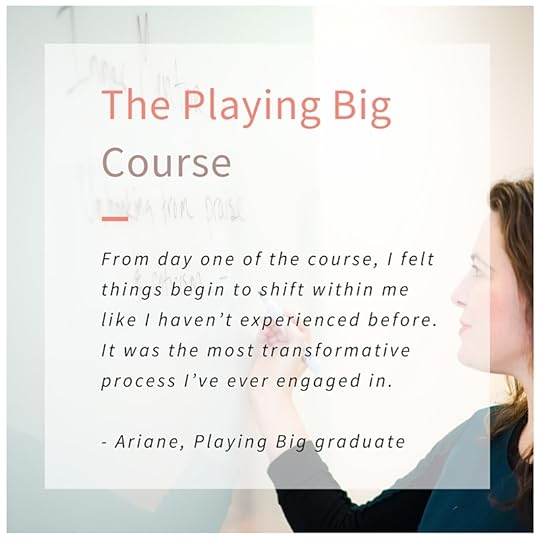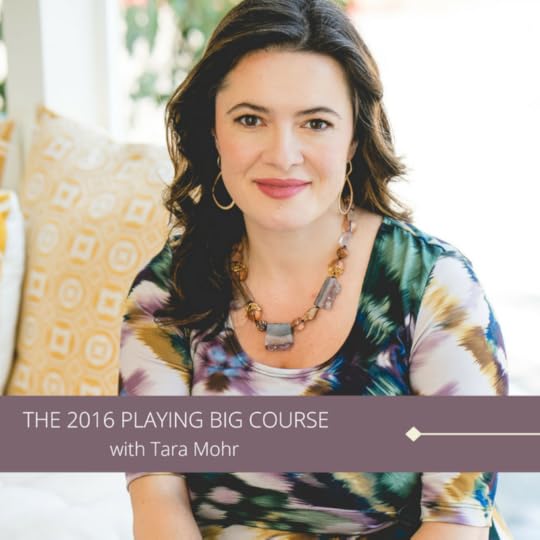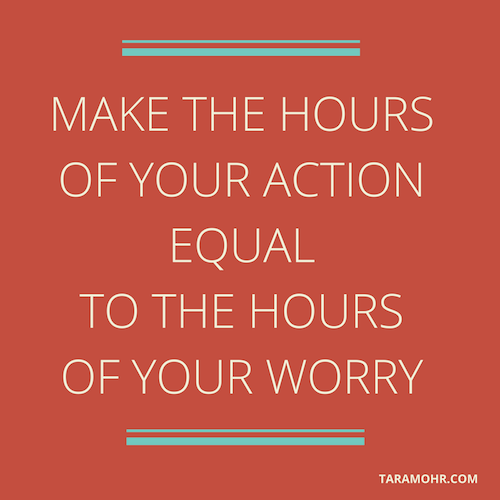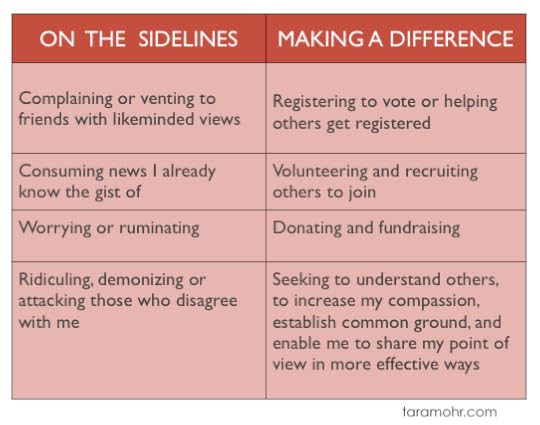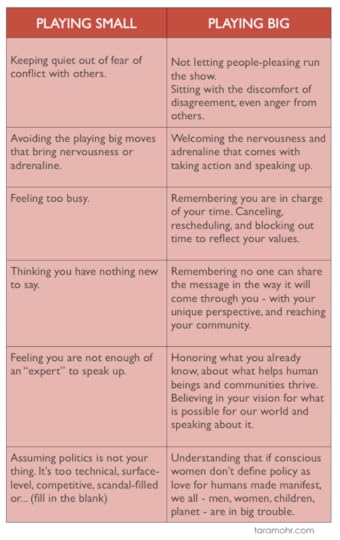Tara Mohr's Blog, page 18
September 21, 2016
Understanding feedback
Good morning!
Today I want to share with you a short audio that I recently recorded for Emerging Women. They have a fabulous series called “Power Practices” of 10-20 minute audios. What I love about this series is that each one offers something you can do in your own life – a “practice” that can help you day to day.
The Power Practice I share here is a powerful one for recovering from difficult feedback of any kind, whether you got that feedback last week or ten years ago (and it still haunts you). It’s also great if a fear of criticism that might come your way is keeping you playing small.
Just grab a pen and paper, and hit play to try this exercise.
And, I’m so thrilled that I’ll speaking at Emerging Women Live 2016 in San Francisco. It’s an incredible conference that I’ve spoken at before that I always treasure attending. You don’t want to miss this event.
This is the last month to save $400 on the registration! Click HERE to get your spot.
September 19, 2016
Playing Big: What You’ll Learn
Good morning!
Today, I’m excited to share some of what you’ll learn in the Playing Big course, and what will be different in your life and work as a result.
If you aren’t yet familiar with the Playing Big model, you’ll be introduced to a whole new world of concepts and tools for your daily life.
If you’re already familiar with the Playing Big concepts through the book, the course will enable you to more powerfully apply them to your life, put your playing big center stage, and get support from me and our community.
You’ll get:
• in-depth material on each of the major topics
• live coaching, discussion, Q&A sessions with me on every topic
• new material and my latest thinking on the topics, not shared anywhere else
• support, learning and camaraderie from our global community of participants
• worksheets and exercises to help you apply the tools
• fun ways to keep your playing big front and center when life gets busy, from inspirational art downloads to daily reminders to keep you on track
Let me take you through an overview of the course modules …
Quieting the Inner Critic
Just imagine for a moment – really imagine – what you’d be doing if that voice of “I’m not ready yet,” or “I need to get a PhD in that topic before I can do that,” or “I don’t really know what I’m talking about here,” wasn’t present anymore? Through our work together, you’ll understand how the inner critic skillfully functions in your life (whether in the domains of career, body image, parenting, romantic relationships, finances, or your creative life). You’ll learn what to do in the moment when self-doubt arises, to ensure that it doesn’t hold you back.
Discovering Your Inner Mentor
After doing the Inner Mentor work, you’ll have an inspiring vision for where you are headed. Whenever you are feeling confused, stuck, or overwhelmed, you’ll be able to access a calm, wise voice within you that has a very different perspective on the tough situations you are facing, and that can show you the way forward. I’ve witnessed this happen for thousands of women, and it can absolutely also happen for you. We also cover the latest research on women and mentoring, who you should seek out as a mentor, and the ways in which effective mentoring relationships for women are dramatically different from what the typical advice says.
Unhooking from Praise and Criticism
After this module, you’ll be a lot less dependent on praise, and a lot more comfortable with criticism and potential criticism. This frees us to speak up, share our ideas, be controversial when it’s needed, and in doing all that, make positive change. You’ll also come away with a new and liberating approach to giving and receiving feedback.
Your Callings
This is one of my favorite topics to teach about, because we have so many misunderstandings around our callings. And yet with some simple ideas and tools, women can start experiencing the huge joy and fulfillment that our callings bring. If you aren’t sure what your callings are, this module will give you a very specific way to figure that out, with coaching from me to help if you get stuck. If you already know what your current callings are, you’ll learn tools to fulfill them in even more satisfying and bold ways.
The End of Hiding
In my work with women, I started to see some very clear patterns in the ways brilliant women hide and stall on playing bigger. These hiding strategies aren’t obvious. They often look, from a distance, like really great career moves. In this module, you’ll discover the unconscious ways you are hiding and start stepping forward instead.
Leaping: The Art of Imperfect Action
Most women I know hold some false assumptions like these: that the more they prepare for something important, the better that something will go. That the more polished their work is, the more favorably it will be received. These assumptions are misleading (if not entirely wrong), and stem from how women and girls are conditioned to act in ways that don’t serve us. In this module, we’ll take a rigorous look at our default good-girl, good-student ways of working and discover a bolder, quicker, more experimental way of working called leaping. Leaping gets us playing bigger right away.
Navigating Negotiations and Difficult Conversations
Do you dread negotiation conversations, feel like you aren’t a great negotiator, or simply know you could be a much better one? In this module, I share a powerful framework that can help you love negotiations and difficult conversations. (It really is possible.) A negotiation isn’t only the once a year conversation over your salary, or client rates. In playing big, we explore negotiations as any conversation in which the parties have differing goals and interests. Negotiation is a skill we all need for our careers – and lives – every day. In Playing Big, you’ll learn and practice a positive, collaborative, step-by-step framework for negotiations, with support from me and from our guest expert on women & negotiation.
Communicating with Power
You’ll learn how you can come across as more competent, compelling and confident in your written and spoken communications. You’ll also learn about important new research on gender and communication in the workplace, and what it means for you. We cover what speech and writing habits to let go of, and what new language you can use instead. I’ll also support you in a day-by-day habit change process, so that your communication is truly more powerful by the time this module comes to a close.
Playing Big while Caregiving
I’m the mother of an active toddler, and am also involved caring for my parents. The past few years have been a deep dive for me into the dance of pursuing my aspirations, while at the same time, showing up in the ways I want to for those I love. In this module, we’ll look closely (and realistically!) at how you can weave together caregiving and playing big.
Let It Be Easy
We’ve all been there: we tried to accomplish something simply out of willpower and self-discipline, failed to do so, and then ended up disappointed in ourselves. This module is about alternatives to self-discipline. I’ll take you through setting up a “success architecture” of supports and routines that allows you to achieve any goal in a sustainable, kind-to-yourself-way.
This is a snapshot of our course modules (you can review the full curriculum HERE), but I hope this gives you a sense of some of the ways your work and life will be different after Playing Big.
If you’re ready to play bigger, we would love to have you join us!
Love,
Tara
September 16, 2016
Playing Big Registration is Open!
From the age of about 5 or so, I would sit down with my mom at the breakfast table in the morning and, over oatmeal and orange juice, we would analyze my dreams. My mom believed dreams were important, and that even at a young age, a person could start to understand themselves better through them.
And if I came home complaining about a kid at school teasing me, my mom would say, “What do you think is going on for her at home that would cause her to tease other kids?”
I was raised in a house where I was encouraged to look at my life, and the world, through a psychological lens. I grew up immersed in learning about the inner life, psychology, and spirituality from all traditions.
But that was only one half of the worldview I was being taught. The other half was very different.
I went to school in competitive academic environments. There, I was being educated in a culture that sharply contrasted with the one I’d learned about at home. School emphasized mind over heart, learned knowledge over intuitive knowing. I went to Yale, I went to Stanford Business School. I learned how to play by the world’s rules.
This is my hybrid path, and it informs the approach I now use throughout my work. Mind and heart. Practical but not cynical. Knowledge and wisdom. Outer action and inner reflection.
The tension between two worlds that was often difficult for me to navigate when I was growing up is no longer a tension, but a fusion. I’m so happy that this fusion is one of the things people find most helpful in my work.
I know this: When you mix inner work with practical skills training, you get power.
Being alive in this remarkable time of new possibilities for women, we benefit so much from doing inner work in areas like unhooking from praise and criticism, clarifying our callings, and learning to manage self-doubt and fear.
But if we only have those tools, we can’t play to our full potential. We also benefit tremendously from learning “skills for world-changing” — such as how to communicate effectively, negotiate without apology, deal with feedback (and pushback), and get our messages out.
Registration opens today for the Playing Big program, my course for women who want to play bigger in their work and their lives.
The Playing Big course offers this hybrid of both inner and outer work. It includes powerful training to manage self-doubt and fear, connect with your inner wisdom, and uncover your right next steps. It also includes training in essential skills like negotiation, communication, sustaining personal motivation, and innovation – how to test, hone and scale anything new – whether a new career direction or a new offering in a business.
Playing Big is for you if you want to make a greater impact, and experience more joy and fulfillment in your work. It’s for you if you want to experience less fear, stalling, and self-doubt around going for your big aspirations, and instead, get going on what you most what to contribute and create.
In my next couple posts, I’ll be sharing about our program curriculum and how we combine inner work with skills training to help you play bigger.
To learn more about the Playing Big program and to get your spot, click here.
Love,
Tara
September 9, 2016
Falling in Love With Motherhood
I’ve written here before about being reorganized by motherhood – about the profound and difficult transition from a former life to a new one that came with my entry into parenthood.
Like most people, before I had a baby, I’d heard the phrase a thousand times, “You can’t imagine how much your life will change when you become a parent.”
Not only could I not imagine it, I couldn’t even locate what they were talking about. I’d lived a largely autonomous life before, where my plans and desires shaped my future. I didn’t know what it was to be changed in ways I didn’t foresee or choose.
Now, I look in the mirror and see a body and face altered profoundly, worn by the daily intensity of the past few years. I know those skin-deep changes are a metaphor: minute by minute, caring for a little person, I’ve been changed, gradually and profoundly.
And here I am, two and a half years into motherhood, and three and a half years into the changed life that began even earlier, with a body overtaken by pregnancy.
On the one hand, I am still being rewoven, reorganized by motherhood. On the other hand, something has settled. The feeling of turmoil around that reorganization has quieted. The feeling of the old me being pulled and kneaded into something new has diminished. The weather in my emotional and mental sky feels less foggy, more serene and consistent. And WE ARE ALL SLEEPING THROUGH THE NIGHT now. Hallelujah.
It was a few years of crossing a long bridge to get here, but now I’m here, on the other side: a mother. A parent. One who has in some strange way been removed from the center of the circle, to become one who nourishes the circle, who stands shoulder to shoulder with others, along the perimeter, to give life to what is now being grown in the center.
Still me but a different me.
And just as things are starting to feel a little calmer, we are about to turn everything upside down again, with a new baby coming in December.
Last night, there I was, walking up the stairs to our front door, feeling the curve and bounce of my growing belly. I was so happy to get home, to see the exuberant toddler I’d missed all day, to hear his sprint to the door, and to meet the face of my husband – the face that after almost twenty (oh my god) years, still grounds me and makes everything in me sigh when I see it. That face that says and means, home.
In this chapter of my life, the blessings of family life feel immense. Our routine is working. I’m on this side of the bridge, on this side of the change, on land again. And I am falling more and more in love with this little boy who has given me the gift of an expanded heart.
I could still cry at some of what has been lost. Even in this moment of gratitude for what is, I could cry about it. Not sadness exactly, just change, just emotion, just the intensity of life.
But mostly I feel like watching, watching all the beauty that is here before me now.
Love,
Tara
August 31, 2016
My Election Commitment. Join Me.
Today, I’m inviting you to join me in a commitment.
As some of you have read about here, for the past several months I’ve been waking up in the middle of the night, worried about what’s happening in our U.S. election.
In July, during one of my nights awake, something interesting happened.
As I stared into the night sky, suddenly a string of words – a thought – arose in my mind.
It came from a soft voice I’ve heard before. That voice is always quiet but firm, matter-of-fact. It never needs more than a few words to say what it has to say. And, interestingly, it shows up more when I’m praying or meditating more frequently.
So, as you can imagine, I’ve come to pay close attention to it.
That night it said this:
“Make the hours of your action equal to the hours of your worry.”
I understood that to mean:
Tara, however many hours you are going to spend ruminating
about the dangers of what’s happening, or venting about them,
spend at least that amount of time doing something that
could make a positive difference.
It suddenly felt clear to me that this is what it means for me to be responsible about what is happening in our country right now. And it also felt clear that this was one of the only ways I was going to find sanity around it.
So then and there, I committed to make the hours of my action equal those of my worry.
The “worrying” side of the ledger includes anything I do around the election that will have no practical impact on its outcome: lamenting or ridiculing what “the other side” just did. Consuming media that largely does the same. It includes any form of preaching to the converted. All of those go on the unproductive side of the tally.
On the other side is volunteering, donating, fundraising, speaking up in ways that I think could matter, and listening in ways that I think could matter.
None of the “worrying” activities are bad. They each have their functions – some educational, some therapeutic. But in this critical time, I believe there is no excuse for making them one’s primary form of engagement.
Here’s a summary of what’s on each side of the tally, for me.
Like so many of the kinds of positive action we talk about in the Playing Big model, the things we do on the “making a difference” side of the ledger may feel a little uncomfortable or scary at first, but ultimately are much more fulfilling, fun and interesting. There is lots of new learning – about yourself and other people – that comes from the activities on the “action” side. Not so much on the other side.
I also encourage you to look at the beliefs you hold as you are taking action – or the beliefs that may hold you back from taking action. For women, “playing small” narratives like these often get in our way around political involvement:
Today, I want to ask you to join me in making the hours of our action equal to – or more than – the hours of your worry. And take stock: how much time are you spending on each side of the ledger?
Tell us “I’m in!” in the comments, and share this with your friends if you’d like them to join, too. Share this challenge with your community on Facebook here, or on Twitter here.
This is going to take all of us.
Love,
Tara Sophia Mohr
And don’t forget…
The next session of my Playing Big Course for women is starting soon!
This is my in-depth personal and professional growth class for any woman who is feeling the call to make a greater impact and experience more fulfillment in her life and work. We cover everything you need to play bigger – including working with self-doubt and fear, unhooking from praise and criticism, communication and negotiation skills, and clarifying your calling.
If you are interested in receiving details about the course and getting access to our early bird discount, sign up for our Playing Big Early Information list here.
August 28, 2016
I still do this. Do you?
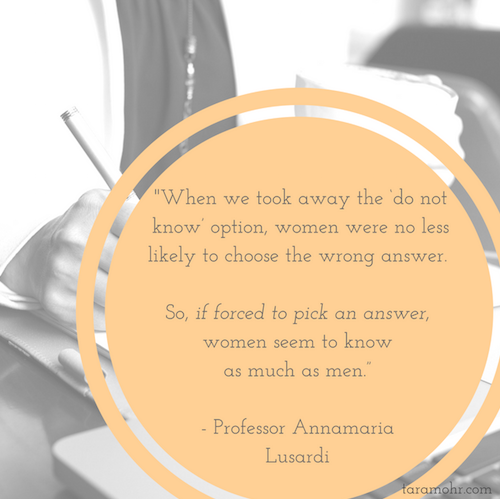
You know that remarkable moment when you recognize yourself – your beliefs, your patterns, your life experience – in something you are reading?
A while back, I was reading about a study on financial literacy around the world.
Here’s what it found:
When researchers gave women and men a short quiz that tested their financial literacy, men did better. Not too shocking, right? Men are exposed to more informal financial education, and they are encouraged to learn about investing and money management. Women often are not.
But there was another part of the research findings that practically knocked me out of my chair.
“When we took away the ‘do not know’ option [from the multiple choice financial tests] women were no less likely to choose the wrong answer. So if forced to pick an answer, women seem to know as much as men,” Professor Annamaria Lusardi, one of the principal researchers, reported.
In other words, the gender gap in the test scores was a result of women choosing “I don’t know” more often than men. When that option was taken away, they performed just as well as their male counterparts.
They knew as much as the men, but they were less likely to trust what they knew. They were less likely to make a guess based on their leanings, their partial knowledge, or their hunches.
That was even true on this test, when (unlike in life) there was absolutely no penalty for making the wrong choice…no risk involved. Yet many women found it more comfortable to choose “I don’t know” than to venture a guess.
Sound familiar?
This is where I recognized myself, and so many women I know. We say, “I don’t know” when we do know. We say “I don’t know” when our knowledge may be partial, but it’s enough to point us in the right direction.
The reasons we do this, of course, are not that we are crazy or deficient in some way, or just not confident enough. The reasons have to do with what we’ve been taught, and what we’ve learned through our life experience.
Boys are taught to cover up anything that could be perceived as weakness or vulnerability; they start getting trained early on to hide uncertainty of all kinds.
At worst, this produces B.S. artists and unwise decisions. At best, it helps competent people lean into what they do know and move forward wisely in the face of uncertainty.
Girls, by contrast, are often socially validated for expressing confusion and uncertainty and turning outward for help and answers. Just think about the size of the “advice to women” industry compared to that of men.
Girls and women are also more likely to be penalized for being wrong. Bias – in women and men – causes women’s mistakes to be seen as more significant indicators of our capabilities than they are in a man. We learn quickly we may be judged harshly for being wrong, and so we become more conservative in speaking up if we aren’t sure about something we’re saying.
Self-Doubt
But for me, the core reason I choose “I don’t know” is that deeply felt sense that somehow, I am an intruder. I’m a visitor from a foreign land, in professional and intellectual life.
This is the well-documented “imposter syndrome” that women – especially high-achieving women – almost universally feel.
That feeling in us is not born of our individual life experiences, but of our strange and wondrous historical moment. Women are now being permitted to step into professional roles and leadership that we have never seen women take on before – roles that for several thousand years prior, society told us we were entirely unsuited for.
Nothing in our bodies, minds or hearts looks at the image of ourselves leading and says, “Oh yeah, of course, that’s for me. Of course, that’s what I’m meant to be. Of course, I’ll do fine.”
Yet you can run this experiment: What happens if you remove the “do not know” option for a while, just as the researchers removed it from their quiz? What if you push a little harder to see what answer you’d lean into if you had to just pick one?
Bottom line?
You know more than you think you do. And we need you to share it.
Join Me This Fall…
The next session of my Playing Big Course for women is starting soon!
This is my in-depth personal and professional growth class for any woman who is feeling the call to make a greater impact and experience more fulfillment in her life and work. We cover everything you need to play bigger – including working with self-doubt and fear, unhooking from praise and criticism, communication and negotiation skills, and clarifying your calling.
If you are interested in receiving details about the course and getting access to our early bird discount, sign up for our Playing Big Early Information list here.
Love,
Tara
August 26, 2016
Are you feeling the call to play bigger?
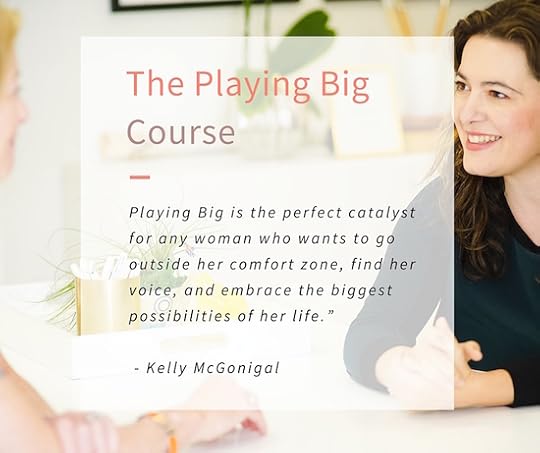
Over the years, I’ve learned this: there comes a time in our lives when the life we’ve been living doesn’t quite fit anymore.
What felt fine before starts to feel constraining, or dull, or gray. We slowly come to realize that one chapter of our lives is ending – or has ended – and it’s going to be up to us to create the next chapter, or to discern what path is calling us.
Although these moments can be uncomfortable, they are incredible opportunities. That part of you that burns for more fulfillment, more authenticity, more impact, and an intensified desire to do what holds meaning for you? In these moments, that part is speaking louder, and you have the opportunity to listen.
If it’s one of those times for you, I want to invite you to join me for the upcoming Playing Big Course and sign up for our Early Information list. This is my pioneering class for women who want to play bigger in their work and in their lives. It happens online and by phone, so you can attend from anywhere around the world.
We are now entering our sixth year of making a global impact in teaching women in business, the social sector, entrepreneurship, academia and the arts to play much bigger.
I’m always honored by what people have to say about their experiences in the course. Here are just a few examples:
“I have gained so much more out of Playing Big than I ever expected. I came in hoping that Playing Big would help me tap into my calling and provide some motivation and tools to pursue it. I did not expect the transformational power of this series. Tara’s tools and exercises get at the heart of playing bigger in a way that is sustainable and that I can keep going back to. I feel that I own my voice more confidently, that I’ve accessed the wisest part of myself, and that I’m showing up more authentically throughout my life. I have strongly recommended this course to all of my friends.” – Betty Chen, Director of Family Engagement at Summit Public Schools
“After attending the Playing Big course, I am much better at communicating from a place of strength. I mentor several colleagues. So often now, concepts we discussed in Playing Big jump out when I’m coaching these ladies. I’m glad I can share some ideas to help them play bigger in their careers. I feel much better about my abilities and contribution in the world. But most of all, I am happier about what I am doing.” – Meg, Finance Executive
“I now have a vision that propels me forward every day. I know that my voice is needed and that I have a duty to play big in this life, to heal the world in the way I know best, no matter what my inner critic voices are telling me.” – Amanda Vella, Yoga Teacher and Writer
Our next session starts in late September.
If you are interested in receiving details about the course, and having access to our early bird discount, sign up for our Playing Big Early Information list here.
With love & gratitude,
Tara Mohr
August 25, 2016
The Playing Big Course is Coming!
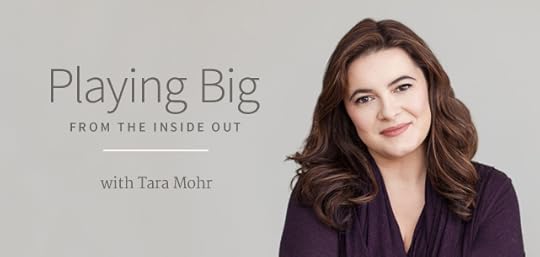
Good morning,
I’m thrilled to share with you that the next session of my Playing Big course is coming up!
This is my course for any woman who wants to play bigger in her life and work.
It’s for you if you know you have a message you want to share, a creation you want to bring forward, or a higher level of impact you want to make and … you know you’d really benefit from some support and structure to help you get there.
In this course, you’ll learn the skills and tools that have helped thousands of women play much bigger:
– how to determine what playing big looks like for you, in this particular season of your life
– how to manage the self-doubt and fear that comes up for all of us as we play bigger
– how to unhook from praise and criticism so you can do your best and most high-impact work
– how to reliably access your own inner wisdom and discern the right answers for yourself
– how to communicate with power and grace
– how to negotiate more comfortably and effectively (and recognizing that you are negotiating every day!)
– how to approach concerns of not being qualified, expert enough, or “ready” to do what you long to do
– how to play big while caregiving
and … much more.
This is an online and webinar-based training, so you can attend from anywhere in the world, and in a way that works with your schedule. I am live with the group every week, so there is lots of time for discussion, Q&A and coaching.
The Playing Big Intensive
This 2016 Fall session is also a special one. Every few years, I offer a Playing Big Intensive session. It is three months long, and we cover all the same material as the regular course, but at a more intensive pace. If you know you like to dive in deep and learn in intensive format, this is a great fit for you. Or if you simply know you really want to get going with your Playing Big this Fall, this is a great fit for you. You will be able to download all the course materials so you have life-long access.
The Playing Big model has been featured in venues ranging from The New York Times to The Today Show and has brought about powerful life and career changes for thousands of women around the world.
Get On The List!
Here’s what to do next. If you would like to know more details about the course and have access to our early bird discount, sign up here.
You’ll be added to our special list for course information, and next week, you’ll start receiving great info from me about what we’ll cover and how to discern if its the right fit for you.
With love,
Tara
August 22, 2016
On Political Fear, Part II
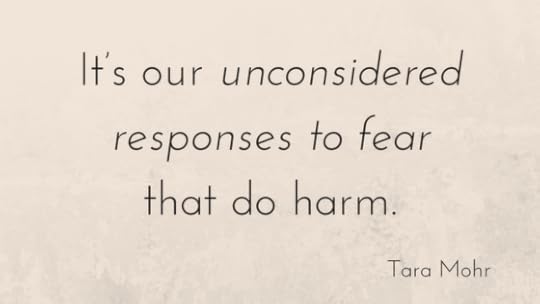
What is your preferred mode of responding to what’s happening in the U.S. election?
Talking with friends with like-minded views?
Turning away from the horrible headlines and focusing on your family?
Volunteering or using your network to try to rally votes for your candidate?
When humans perceive a threat, we feel fear. Then almost immediately, our bodies go into a fear response. Although fight/flight is the most well-known and well-studied of human fear responses, neuroscience research has in fact found there are six classic human (and mammalian) fear responses:
1. Fight: try to defeat the danger
2. Flight: try to escape
3. Tend: focus on caring for offspring
4. Befriend: reach out to the social group for support and mutual protection
5. Freeze: play dead until the threat has passed, so you won’t be targeted
6. Appease: try to placate or please the predator
Right now, across the political spectrum, most of us are showing up in the world with our responses to our fear.
We see many people in “fight” mode – using words, dollars, and a host of other strategies to defeat the threat they perceive.
We see some people in “flight” mode, avoiding the news or imagining moving to Canada.
We see some people doing “freeze,” like elected officials laying low and quiet until the election cycle ends.
We see some people going in “tend” mode: “I just can’t deal with how horrible this situation is, and I need to focus on my kids right now anyway.”
And many of us find comfort in “befriend” mode, commiserating with like-minded people on Facebook for hours on end, or venting with friends about the latest appalling news.
Fear vs. The Fear Response
These are all ways of spending time in our responses to fear. None of them are bad. What can be problematic about them is that they are often automatic and wholly unconscious.
After all, our hard-wired responses to fear (fight, flight, tend, befriend, freeze or appease) come from the oldest, reptilian part of our brains. Our fear response is designed to be instinctual and immediate because way back when, if a predator suddenly visited, we needed to respond, with action, in that instant. No time for thinking.
So today, if we go with our instincts, our responses to a threat – a political, emotional, or physical threat – will generally come in the absence of any consideration, before there is even a moment for thought. Think reflex, think kneejerk response.
This is why in the fields of mindfulness, personal growth and psychology, we talk so much about being in touch with how we are feeling and slowing down to investigate it and process it, before taking action. That is why we advocate for the importance of spending time in the feeling itself rather than only responding to it. We know about the incredible opportunity presented by that moment – as Vicktor Frankl put it, “between the stimulus and response.”
It’s there that we can process our feelings in a healthy way and make wise choices about what to do next.
Franklin Delano Roosevelt’s famous line, “The only thing we have to fear is fear itself,” is often understood to be a criticism of fear.
But the words that immediately followed suggest otherwise. Here’s what he in fact said to Americans, as they faced the Great Depression in 1932:
“The only thing we have to fear is fear itself—nameless, unreasoning, unjustified terror which paralyzes needed efforts to convert retreat into advance.”
He is speaking about one kind of fear: fear that hasn’t been named, reasoned through, or understood. And the real threat, he says, is retreat – the way fear can send us into a flight response if we don’t bring consciousness to it.
Maybe we leave out the second part of the quote so often because Americans like the fantasy of “No Fear” more than we like – or even understand – the act of naming fear or reasoning through fear.
It’s our unconsidered responses to fear that do harm. And of course, this is true not just for political fear, but for any fear you feel in your life – the fears that are intelligible and especially those you feel that you cannot yet describe or name.
Let this be your practice for today. Use writing, talking it out, or meditation to do it. Sit with the fear you feel around our political, social, civic situation right now. Investigate it: what is the core, underlying fear? Let it take you to what you most cherish. Breathe into the fear. And then inquire, what truly wise action can I take to respond?
Share this post on Facebook here, or on Twitter here.
Love,
Tara
August 16, 2016
On Political Fear
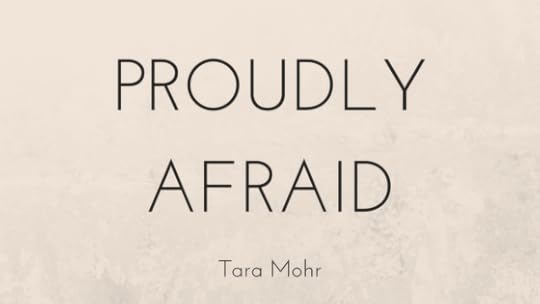
Since March, I’ve only slept through the night a few times.
The reason I’m up at 2 or 3 am is the election. Which is to say, the reason I’m up is: I’m afraid.
I feel sheepish telling you that, like it’s risky. “Aren’t I supposed to be brave and strong?” the thought goes. Or, “Wouldn’t it better serve people to only show the strong part, not the afraid part?” another thought says.
But there’s another part of me that knows the first thing to tell you, as I start to write to you more about this upcoming election, is this: I’m scared.
I’m the daughter of a refugee and Holocaust survivor. I grew up surrounded by the stories of how fast a civilized society unraveled. I’m not naive about the possibilities.
Sure, my fear has lessened a bit in the past few weeks, as more people speak out and the polls move in a direction that comforts me. But I know that a lot can happen in 90 days, and a lot can happen on a single election day, especially regarding turnout. I’m not sleeping through the night yet.
I’ve somehow absorbed the very American idea that heroic equals hopeful and that expressing fear is weak and morally questionable – that’s not what good, strong people do.
I’m not alone in this. No one I know has mentioned to me that they’re also awake in the middle of the night. But when I tell them I’m up, and why, a number of my friends have said right away, “Me, too. Can’t sleep. I’m so scared about what’s happening.”
And did you notice how at the Democratic convention, it was acceptable for the leaders at the podium to talk about the grave danger of an uninformed, vindictive, emotionally out of control candidate? But nobody talked about feeling afraid of that danger.
Look in the Op-Ed pages of most of the major newspapers and you’ll find the same – impassioned, articulate pieces about the risks of a Trump presidency. But nobody talks about being afraid of it. That’s crossing an American taboo.
We don’t want to show fear, perhaps because we still see leadership as a patriarchal act – in the most literal way – and just like a family patriarch would likely hide his fear from his young children, our leaders think they should hide theirs.
I can’t help but feel how it also has something to do with the stereotypes: the brave male hero showing no fear, the frightened female waiting to be rescued. Most of our cultural stories tell us that to express fear is to be womanly, and to be womanly is not leader-ly.
I feel just the opposite – that right now, in the context of this election, feeling afraid and talking about it is for the good. I am afraid because I am awake to what I’m seeing. I’m afraid because the mother spirit in me is fierce, and she is always alert to the dangers on the horizon that threaten those she loves. So I’m going to do something very taboo: I’m going to be proudly afraid.
Fear Takes Us To What We Love
In True Refuge[image error], psychologist Tara Brach writes about her experience slowing down to inquire into and feel her political fear. She writes,
In the weeks before the [Iraq] invasion, I read the newspapers with an increasing sense of agitation… So I decided to start a newspaper meditation… Almost every day, as I’d open to anger and feel its full force, it would unfold into fear—for our world. As I stayed in direct contact with the fear, it would unfold into grief—for all the suffering and loss. And the grief would unfold into caring about all those beings who were bound to suffer from our warlike actions….
Sitting with the feelings that arose in my newspaper meditation left me raw and tender. It reminded me that under my anger and fear was caring about life. And it motivated me to act, not from an anger that focused on an enemy, but from caring.”
Like Tara Brach, I know I can’t feel my fear for long before I start talking, tenderly, about what I hold dear: Peace and safety for all human beings. Leaders who know how to de-escalate. People who believe we are all children of the divine, worthy of kindness, compassion and opportunity.
We can only use fear in this positive way if we understand how to make an important shift from living in our fear response – usually fight or flight – to pausing and feeling what comes before that response, and what lies underneath it: the fear itself. Our fear response will often take us into defensiveness, attack, denial, or avoidance. Leaning into the fear itself – feeling it, speaking about it, investigating it – is something very different.
Let’s Start Here
If we paused right now and felt our fear, looking right into one another’s eyes as we did, that would take us all to the place of caring. It would get us talking about, and feeling, what we collectively cherish. It would give rise to a deeper motivation and passion to protect what we love.
So let’s start with a damn good fear party. I don’t know exactly what a damn good fear party is because I’ve never held or been to one before, but I have an inkling that it has to do with pausing to feel our fear – together – long enough for it to take us to a tearful conversation about what we love and want to protect. Then that leads to passion, creative solutions, and the opportunity for a wise – not kneejerk – response.
Can’t our fear – healthy, conscious, fierce mother spirit fear – lead us into fiery passion for what we cherish? Can’t it give us energy and commitment to take wise action?
I think it can.
Share this post on Facebook here, or on Twitter here.
Love,
Tara



